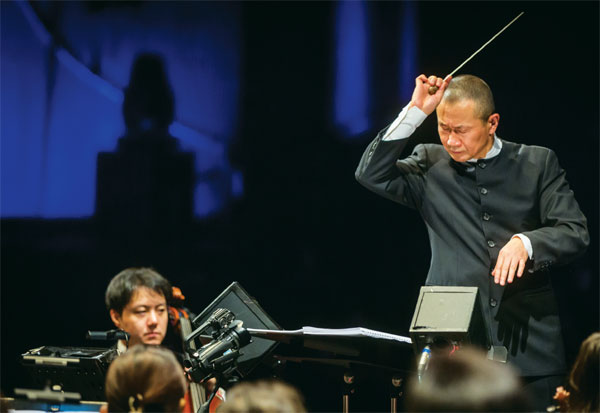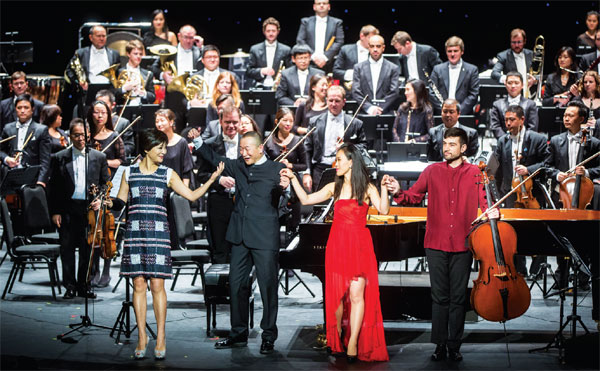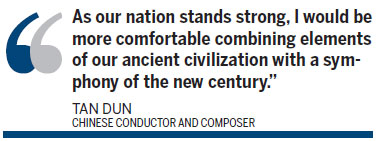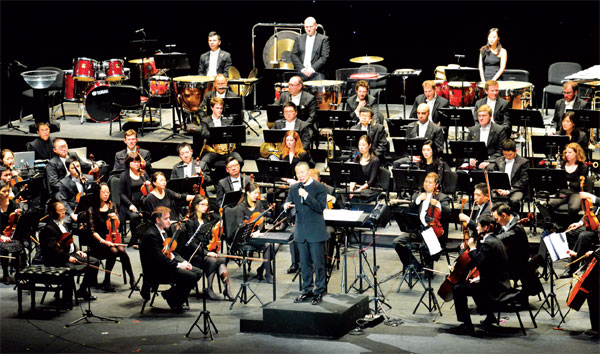Freedom song
Updated: 2014-12-13 07:47
By Selena Li(HK Edition)
|
|||||||||

|
World-famous Chinese conductor Tan Dun strikes a chord with the audience at a concert on Dec 9 to mark the 15th anniversary of the founding of Macao Special Administrative Region. Provided to China Daily |
Chinese symphony sets sails on ancient maritime Silk Road. A report by Selena Li in Macao.
Against the glint and flash of cold steel on the screen, dozens of violinists percussed the strings, releasing grating sounds. It was as if a warrior lunged towards the audience with a drawn sword, braving the galloping sharp arrows scraping past him. A conductor with knitted brows held center-stage, expressing the feel and ethos of martial arts in all its many-splendored glory through the nifty strokes of his baton.
Presented by Tan Dun, a world-renowned Chinese conductor and composer, Martial Arts Trilogy was staged for the first time in Macao. The event was one among the many cultural events held to celebrate 15 years of the Macao Special Administration Region - a new identity for an erstwhile port city along the ancient maritime Silk Road.
"The trilogy is a blend of Chinese classics and traditional Chinese music that embodies the foundation of a globally-recognized Chinese value. We can find revived hope, dream and love in the concert. This is a token of an artist's blessings on the 15th anniversary of Macao's return to our motherland," Tan said.
Three soloists, Hong Kong violinist Yao Jue, Italian cellist Amedeo Cicchese and American pianist Jessie Chang, together with 70 musicians of Macao Orchestra, combined the splendor of Chinese martial arts and the majesty of Western mythology at the Dec 9 show.
The Venetian Theatre in Macao saw the debut of Resurrection: the Martial Arts Cycle, the finale of the trilogy. It carries on the spirit of heroism and passion inspired by martial arts movies from the first two chapters of the trilogy. The films include Zhang Yimou's Hero, Ang Lee's Crouching Tiger, Hidden Dragon, and Feng Xiaogang's The Banquet.
Seventy percent of the orchestra members came from outside of China. Under the leadership of the maestro, they played in perfect sync.
Think local, play global
Before the sound of splashes coming from two water urns faded away, Tan reached out on the podium, with the palms up and figures making a shape of lotus like a believer of Buddhism sitting in meditation.
"I don't perform the actions that conductors do when leading an orchestra performing Beethoven. I learn from martial arts and traditional Chinese culture. It's like when we say 'the more national, the more worldwide'. The key to presenting our culture to the world lies in the wisdom to interpret them in terms of tangible physical philosophy," Tan told China Daily.
Tan has won several international awards - a Grammy, an Oscar and a Grawemeyer Award for classical composition among them. He has made an indelible mark on the world's music scene with a creative repertoire that preserves long-lost treasures in the nation's culture. And he is confident that Chinese art forms, such as his own compositions, might go a long way in spreading values to be shared by the world.
"As our nation stands strong, I would be more comfortable combining elements of our ancient civilization with a symphony of the new century. This is something we cannot find in Germany or Russia, but will find in China," Tan added.
Contact the writer at selena@chinadailyhk.com


(HK Edition 12/13/2014 page9)
